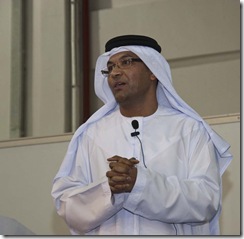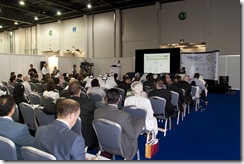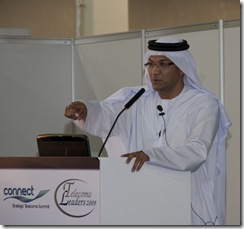The success of mobile broadband uptake in Saudi Arabia is a well documented occurrence, though few can place it in better context than Khalid Al Kaf, CEO of Mobily. Speaking to a distinguished audience at the inaugural Telecoms Leaders event held at MECOM 2009, Al Kaf articulated the presentation of the day, and shed light on why mobile broadband has and continues to be such a runaway success in the kingdom
Al Kaf believes the mobile industry is poised to be the natural and therefore main means of accessing broadband data in the future
Khalid Al Kaf, CEO of Mobily in Saudi Arabia likes to distinguish the development of the operator’s broadband strategy between the activities it undertook prior to the May 19, 2007 launch of UMTS/HSDPA; from how radically differently it conducted business from that date forth.
Mobily launched commercial services in the kingdom in May 2005, two years prior to its introduction of HSDPA. Internet penetration was rising steadily in Saudi Arabia, and figures from the Saudi regulator, the Communications Information Technology Commission (CITC), estimate that Internet penetration at the end of 2005 stood at 13 per cent, growing to 20 per cent by the end of 2006. At that time dialup was the most popular consumer technology used to access the Internet, and ADSL was the technology of choice for broadband access.
According to Al Kaf, Mobily’s introduction of HSPDA led to a complete revolution in the way people accessed the Internet as well as the ubiquity of the access to broadband services. Mobily first introduced Saudi Arabia’s pioneering HSDPA device based on a PCMCIA platform for laptops supporting 1.8 Mbps on the downlink. The operator then went on to introduce an unlimited mobile data plan and two high volume bundles, thereby introducing the concept of unlimited mobile access to data in the kingdom for the first time.
“Around 10-15 per cent of all laptops sold in the month following the introduction of our HSDPA service were ones linked to the Mobily offer,” Al Kaf recalled. “The average daily growth for the six months of 2007 was around 400 subscribers, and for 2008 it was over 520. This daily growth rate tripled for the first four months of 2009 to over 1,500 new subscribers a day.”
Mobily has the distinction of being the busiest mobile data network in the world with the volume of traffic for April 2009 standing at 28.3 terabytes a day, representing a 194 per cent growth rate during the month. As of the end of 2008, 24 per cent of all broadband users in Saudi Arabia were accessing services using HSPA, while ADSL remained the broadband technology of choice with 74 per cent of broadband users utilising that technology. Two per cent of broadband users utilised WiMAX.
“Mobile broadband use will exceed fixed broadband ADSL use in the next few years,” forecasted Al Kaf. “Seventy per cent of broadband applications in Europe are for mobile,” according to Al Kaf, suggesting that the potential of the access technology is clear to everyone to see.
Mobily went on to launch HSUPA in March 2009, extending HSPA coverage to 218 cities, towns, villages and regions across Saudi Arabia as at the beginning of June.
Having unsuccessfully bid for a fixed line licence Mobily went on to acquire alternative provider Bayanat in 2007, giving it access to a 12,000 kilometre national fibre-optic network as a well as aspirations to invest in WiMAX technology.
Al Kaf explained that Mobily inherited 40,000 WiMAX subscribers from Bayanat together with 400 base stations, with Mobily looking to increase that number to 1,000. The mix of broadband technologies is intended to appeal to every usage pattern, with the main mass market technology being HSPA+, and WiMAX being an alternative to offload capacity in dense and high usage areas. “WiMAX is in direct competition to ADSL,” Al Kaf asserted.
Having started to undertake HSPA+ trials in February 2009 and LTE trials in April, Al Kaf believes Mobily is on track to launch LTE commercially by 2012 at the very latest. The operator has also been taking an active role in the development of devices to compliment its network upgrades and is currently cooperating with Qualcomm in the development of a hybrid device that incorporates content services.
“The point is to move from access provision terminals to hybrid connectivity/content delivery devices,” Al Kaf said. The offer of blended services is central to Mobily’s data strategy going forward, adapting technology platforms to ensure that they can enable new services and applications, including those marketed by third parties, and host them while retaining some value.
Mobily is also looking to adapt cultures to promote innovations, meaning that while the operator’s culture has traditionally been based on the need to deliver predictable and scalable services and avoid risk to ensure a good customer experience, Al Kaf believes that nowadays risk-avoidance needs to co-exist with risk-taking in new services.
Time to market will also play an increasingly important role in producing success as the operating environment becomes much more dynamic, and the establishment of partnerships in short time frames is also a key success factor. Al Kaf believes this would best be achieved through sharing part of the value created with third parties, while maintaining control of Mobily’s position in the value chain.
Khalid Al Kaf addresses delegates at the inaugural Telecoms Leaders Summit held at MECOM 2009 in Abu Dhabi
Al Kaf describes the environment in which Mobily operates as a “flourishing ecosystem of many innovators, with a rapid birth-death cycle, hosted on a limited number of platforms,” where the creation of value lies in mobile communications’ power to capture the end-user’s context. Thus he views Mobily’s current offerings as existing in stage three of the three stages of technology – infancy; adopting its own personality; shaping the world – representing an environment where people turn away from newspapers and TV toward Internet news, or create their own media outlets (see table 1).
The nature of competition in Saudi Arabia’s mobile market is likely to spur on continued innovation from Mobily and its competitors, all the time improving the service that end-users can expect to receive. Last year Mobily undertook a review of its retail strengths and weaknesses, resulting in
Mobile broadband use will exceed fixed broadband ADSL use in the next few years. Seventy per cent of broadband applications in Europe are for mobile a revamp of its flagship stores and customer service points. At the end of 2008 the cellco operated 32 flagship stores – including three megastores in Riyadh, Jeddah and Khobar – as well as 240 fully-branded outlets operated by partners. The revamping was a joint project between retail and marketing business unites in order to enhance Mobily’s retail image and reinforce the brand in the Saudi market.
Mobily’s evolving store concept vision is based on four principles: to attract customers into a zone through a compelling design which sparks curiosity; allowing customers to freely explore and seek their own version of knowledge; fostering an emotional connection through the branded experience, interaction and sales consultation; and the ability for sophisticated showcasing of capabilities. 
By the start of this year eight stores had been revamped with features including Internet cafés; giant screens displaying inspirational videos linked to Mobily’s 3.5Gservices; self-service recharge and bill-paying kiosks; gaming areas with comfortable seating; and interactive displays where visitors can try out video telephony, video mail and TV streaming services, among others.
Mobily’s efforts were rewarded in January when it won the Best International Store Design award.





0 comments ↓
There are no comments yet...Kick things off by filling out the form below.
Leave a Comment